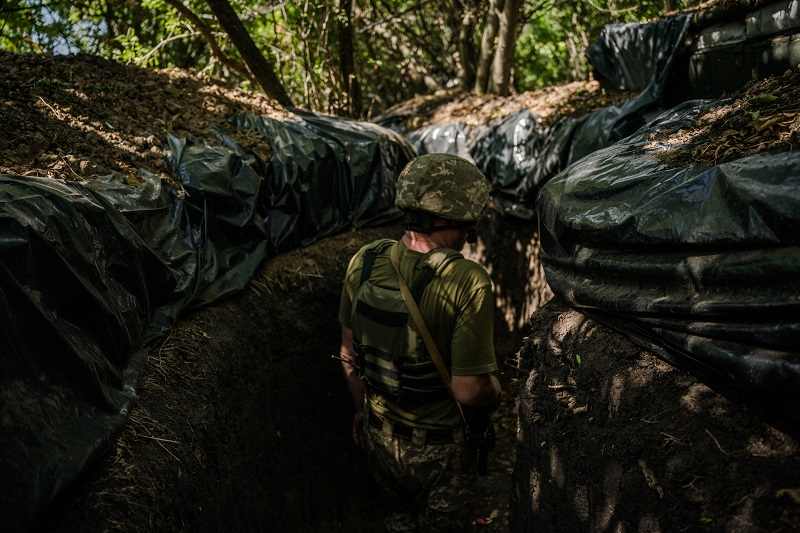
A Ukrainian soldier stands in a trench on the Kherson front line in the Mykolaiv region of Ukraine on Aug. 8.
13:44 JST, August 13, 2022
The United Nations appealed for a demilitarized zone to protect a nuclear plant in southern Ukraine, and a ship will carry Ukrainian grain to hunger-hit countries in the Horn of Africa.
The U.N. chief called for the withdrawal of military forces and equipment from around the Zaporizhzhia nuclear power plant, Europe’s largest, which Russia seized from Ukraine. As the two countries accuse each other of shelling near the facility, the global atomic energy watchdog, the IAEA, warned of potential disaster as U.N. officials urged a cease-fire at a Security Council emergency meeting.
Russia’s U.N. envoy said the IAEA may visit the nuclear plant soon, but shifted the blame on others for preventing access to the facility, which sits in a part of Ukraine that Russian forces control. He also said the U.N. proposal for a demilitarized perimeter was not clear. The head of the International Atomic Energy Agency has for weeks asked for access to inspect the facility but says his requests have gone unheeded.
Also Friday, the Brave Commander, a cargo vessel chartered by the United Nations, will export more than 23,000 metric tons of grain to Ethiopia through the port of Djibouti. The bulk carrier will deliver the shipment under a deal to lift Russia’s blockade on Ukrainian grain, as the war drives up prices and worsens a global food crisis. Somalia, Kenya and Ethiopia are also dealing with their worst drought in decades, with more than 18 million people facing acute food insecurity.
Two more ships left Black Sea ports Friday under the deal, one of them carrying 3,000 metric tons of wheat, according to the Defense Ministry in Turkey, which helped broker the deal with U.N. help. That vessel, the first loaded with wheat to leave Ukraine, is going to a coastal city west of Istanbul, while the second is taking 60,000 metric tons of corn to Iran. Many countries rely on Ukraine, a big wheat exporter, for vital staples such as bread. Somalia, for example, relies on Russia and Ukraine for more than 90% of its wheat imports.
In other developments from the war in Ukraine:
-A Russian journalist who protested the Ukraine war has been put under house arrest until Oct. 9. Marina Ovsyannikova, who worked as an editor for Russian state TV Channel One, held an antiwar picket on July 15, holding a poster showing children who died in Ukraine with the inscription: “How many more children must die before you stop?” Any show of protest against the Russian military’s involvement in Ukraine can be punishable by up to 15 years in prison, under Moscow’s draconian “fake news” law.
-Ukrainian President Volodymyr Zelensky told his government officials to stop divulging details about military tactics to reporters. In a nightly address, he said revealing defense plans for “big headlines” was “frankly irresponsible.”
-Missiles hit Ukraine’s second-largest city, Kharkiv, regional governor Oleh Synyehubov said. He reported damage to an educational institution, an administrative building and warehouses overnight.
-At least eight Russian fighter aircraft were “almost certainly destroyed or seriously damaged” in Tuesday’s explosions at the Saki Air Base in Crimea, the British Defense Ministry said. “The airfield probably remains serviceable,” it added. A Ukrainian official, speaking on the condition of anonymity, told The Washington Post earlier that Ukrainian special forces were behind the attack on the Russian base.
-Ukrainian officials have called for the United Nations and the International Committee of the Red Cross to send representatives to areas where Moscow is holding prisoners of war from Ukraine. According to Reuters, the request was made in light of allegations that Russia staged an explosion in a prisoners’ camp in Olenivka. Moscow denies responsibility and claims that Ukraine was behind the shelling, which killed at least 50 people in late July.
-The Kremlin’s war in Ukraine has set the Russian economy back four years in the first quarter since the invasion, opening the door to one of the country’s longest downturns, according to Bloomberg. Russia’s central bank on Friday forecast a 2022 GDP decline of 4% to 6% and annual inflation of up to 15%. It predicted the economy would not return to growth until 2025.
-Russia rejected a Swiss offer to mediate with Ukraine. A Russian Foreign Ministry spokesman said his country no longer considers Switzerland neutral after it joined Western governments in imposing sanctions on Moscow.
-Latvia and Estonia quit a forum with China for boosting ties with Eastern European countries. The U.S. State Department described the move as the result of “deep concern” about Beijing’s “strategic alignment with Russia.”
Top Articles in News Services
-

Survey Shows False Election Info Perceived as True
-

Prudential Life Expected to Face Inspection over Fraud
-

Hong Kong Ex-Publisher Jimmy Lai’s Sentence Raises International Outcry as China Defends It
-

Japan’s Nikkei Stock Average Touches 58,000 as Yen, Jgbs Rally on Election Fallout (UPDATE 1)
-

Japan’s Nikkei Stock Average Falls as US-Iran Tensions Unsettle Investors (UPDATE 1)
JN ACCESS RANKING
-

Japan PM Takaichi’s Cabinet Resigns en Masse
-

Japan Institute to Use Domestic Commercial Optical Lattice Clock to Set Japan Standard Time
-

Israeli Ambassador to Japan Speaks about Japan’s Role in the Reconstruction of Gaza
-

Man Infected with Measles Reportedly Dined at Restaurant in Tokyo Station
-

Videos Plagiarized, Reposted with False Subtitles Claiming ‘Ryukyu Belongs to China’; Anti-China False Information Also Posted in Japan























